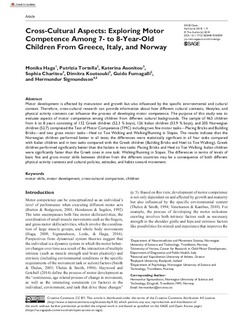| dc.contributor.author | Haga, Monika | |
| dc.contributor.author | Tortella, Patrizia | |
| dc.contributor.author | Asonitou, Katerina | |
| dc.contributor.author | Charitou, Sophia | |
| dc.contributor.author | Fumagalli, Guido | |
| dc.contributor.author | Sigmundsson, Hermundur | |
| dc.date.accessioned | 2019-01-25T11:13:59Z | |
| dc.date.available | 2019-01-25T11:13:59Z | |
| dc.date.created | 2018-04-04T14:44:12Z | |
| dc.date.issued | 2018 | |
| dc.identifier.issn | 2158-2440 | |
| dc.identifier.uri | http://hdl.handle.net/11250/2582341 | |
| dc.description.abstract | Motor development is affected by maturation and growth but also influenced by the specific environmental and cultural context. Therefore, cross-cultural research can provide information about how different cultural contexts, lifestyles, and physical activity contexts can influence the process of developing motor competence. The purpose of this study was to evaluate aspects of motor competence among children from different cultural backgrounds. The sample of 463 children from 6 to 8 years consisting of 132 Greek children (52.3 % boys), 126 Italian children (53.9 % boys), and 205 Norwegian children (52.7) completed the Test of Motor Competence (TMC) including two fine motor tasks—Placing Bricks and Building Bricks—and two gross motor tasks—Heel to Toe Walking and Walking/Running in Slopes. The results indicate that the Norwegian children performed better in all tests; the differences were statistically significant in all four tasks compared with Italian children and in two tasks compared with the Greek children (Building Bricks and Heel to Toe Walking). Greek children performed significantly better than the Italians in two tasks: Placing Bricks and Heel to Toe Walking. Italian children were significantly faster than the Greek ones in one task: Walking/Running in Slopes. The differences in terms of levels of basic fine and gross motor skills between children from the different countries may be a consequence of both different physical activity contexts and cultural policies, attitudes, and habits toward movement. | nb_NO |
| dc.language.iso | eng | nb_NO |
| dc.publisher | SAGE Publications | nb_NO |
| dc.rights | Navngivelse 4.0 Internasjonal | * |
| dc.rights.uri | http://creativecommons.org/licenses/by/4.0/deed.no | * |
| dc.title | Cross-Cultural Aspects: Exploring Motor Competence Among 7- to 8-Year-Old Children From Greece, Italy, and Norway | nb_NO |
| dc.title.alternative | Cross-Cultural Aspects: Exploring Motor Competence Among 7- to 8-Year-Old Children From Greece, Italy, and Norway | nb_NO |
| dc.type | Journal article | nb_NO |
| dc.type | Peer reviewed | nb_NO |
| dc.description.version | publishedVersion | nb_NO |
| dc.source.volume | 8 | nb_NO |
| dc.source.journal | Sage Open | nb_NO |
| dc.source.issue | 2 | nb_NO |
| dc.identifier.doi | https://doi.org/10.1177/2158244018768381 | |
| dc.identifier.cristin | 1577379 | |
| dc.description.localcode | © The Author(s) 2018. This article is distributed under the terms of the Creative Commons Attribution 4.0 International License (http://creativecommons.org/licenses/by/4.0/) | nb_NO |
| cristin.unitcode | 194,65,30,0 | |
| cristin.unitcode | 194,67,40,0 | |
| cristin.unitname | Institutt for nevromedisin og bevegelsesvitenskap | |
| cristin.unitname | Institutt for psykologi | |
| cristin.ispublished | true | |
| cristin.fulltext | original | |
| cristin.qualitycode | 1 | |

